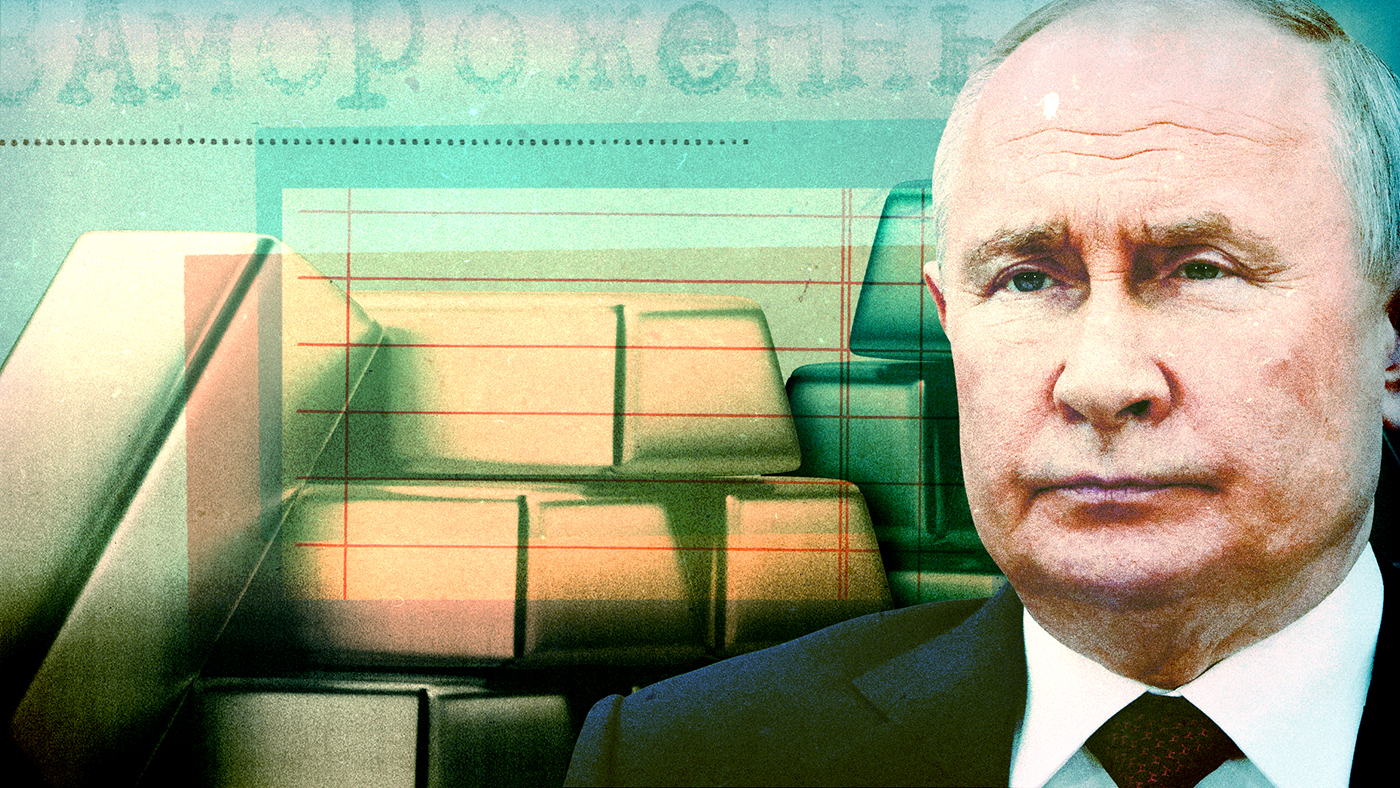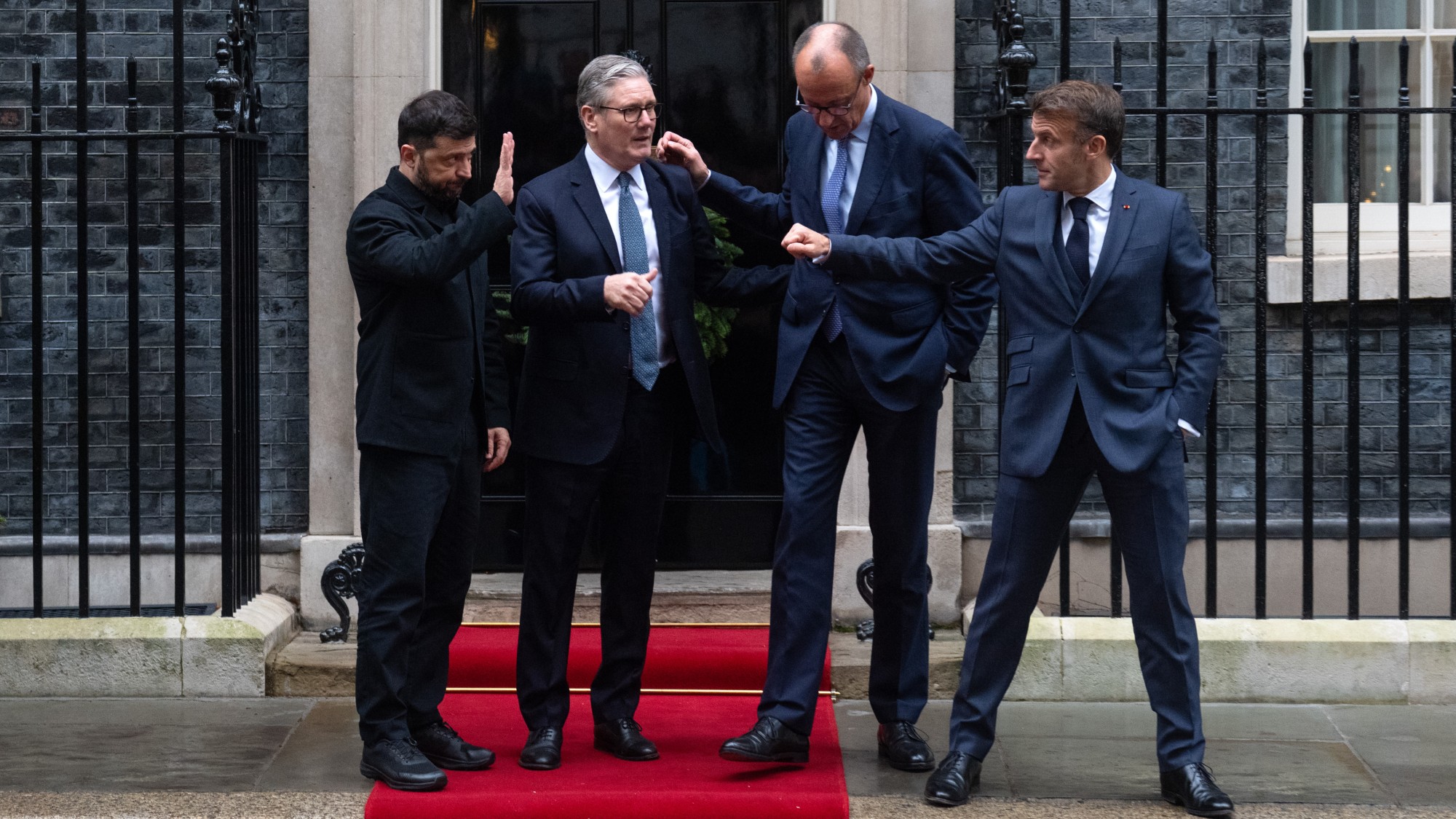Is there a way to get Russia to pay for the war?
Global powers have begun wrestling with the thorny question of how to make Putin pick up the tab for Ukraine's reconstruction


A free daily email with the biggest news stories of the day – and the best features from TheWeek.com
You are now subscribed
Your newsletter sign-up was successful
It's been more than a year since Russian President Vladimir Putin launched his ongoing invasion of neighboring Ukraine, setting off one of the bloodiest and most consequential European conflicts in recent memory. Images of bomb-pocked streets and burnt-out apartment buildings have become commonplace as the world continues to follow the back and forth of Russian and Ukrainian forces fighting on both sides of an imperial expansion effort that's rallied global support for Ukrainian President Volodymyr Zelenskyy, while laying bare Putin's own struggles both international and domestic. But even as the conflict continues to rage with a massive Ukrainian counteroffensive currently underway, many of the world's biggest powers have begun looking ahead to what will happen after the war ends — and perhaps most importantly: who's going to pay for it all?
In March, the World Bank estimated the total cost of Ukrainian reconstruction would hit $411 billion — simply to cover the first year of Russia's attempted invasion — and "is expected to stretch over 10 years and combines both needs for public and private funds." Staggering as that amount may be (it's more than two and a half times Ukraine's total GDP last year), it's on the conservative side of things, with other monetary bodies more than doubling the estimated cost of reconstruction to over a trillion dollars in order to cover the damages wrought by Russian forces. And while the broad consensus across Western allied nations is that Russia must ultimately foot the bill for Ukraine's reconstruction, the exact mechanisms for making that happen are decidedly less clear. Will the Putin regime actually end up paying for Ukraine's return to normalcy, and if so, how can Ukraine's allies make sure the Russian check will actually clear?
What are the commentators saying?
"In principle, it is clear-cut: Russia must pay for the reconstruction of Ukraine," Swedish Prime Minister Ulf Kristersson declared in February, admitting as well that "this must be done in accordance with E.U. and international law, and there is currently no direct model for this." Still, with hundreds of billions of dollars in Russian assets frozen by Western allies, the basic dynamics seemed obvious: the money is there, and ready to be applied, somehow, toward Ukrainian aid. "But that has proved far more difficult than first imagined, and it appears less and less likely," The New York Times reported on Friday. "Experts warn that it would likely violate international law and potentially set a dangerous precedent for countries to take the assets of others." Indeed, U.S. Treasury Secretary Janet Yellen had warned of "significant legal obstacles" to applying frozen Russian funds toward reconstruction, noting the difference between assets seized as part of criminal investigations, as opposed to those seized from a country's central bank through international sanctions. "We have on this small scale, seized assets," she cautioned "but there are certainly legal challenges in doing more than that."
The Week
Escape your echo chamber. Get the facts behind the news, plus analysis from multiple perspectives.

Sign up for The Week's Free Newsletters
From our morning news briefing to a weekly Good News Newsletter, get the best of The Week delivered directly to your inbox.
From our morning news briefing to a weekly Good News Newsletter, get the best of The Week delivered directly to your inbox.
Noting that "the moral case to make Russia pay is obvious," The Economist also highlighted the realpolitik necessity of pushing Russia to foot the reconstruction bill. "For Ukrainians and their backers, the war is not just about defending one country against an aggressor but also about upholding the post-1945 global order, which underpins the world's economy and security," it said. To that end, "whatever the West does with Russia's frozen assets will set a precedent that will shape global behaviour for decades to come."
There are, in fact, existing legal avenues to begin the process of channeling Russian money toward Ukraine. "The assets could be seized through a vote in the United Nations Security Council, a ruling of the International Court of Justice or a postwar deal," the Times said, adding that "none of those options seem very likely," given existing ICJ precedent and the virtually guaranteed threat of a Russian veto at the UN. To that end, the European Union is exploring a creative solution that would leave the initial seized funds untouched, instead taxing the interest they've generated while being held "central securities depositories" or simply using the profits outright. Still, those options are fraught with their own challenges, Politico reported, with experts worried "it could discourage other countries to keep their foreign reserves in euros, as well as put European financial intermediaries at a disadvantage if the EU were to go it alone."
What could happen next?
For now, the bulk of the world's focus remains on the ongoing fighting between Ukraine and Russia. Although the European Union had pledged to release a plan for new laws to facilitate the funding by this summer, that deadline has passed, and "any proposal for a new law to make use of the Russian assets has been postponed to the fall," the New York Times said.
Should Russian assets ultimately be applied to Ukrainian reconstruction, the benefits would likely extend beyond the brick-and-mortar work of rebuilding the devastated country, "Seizing these assets would also help fix an overlooked issue facing Ukraine: investor hesitancy," The Atlantic's Casey Michel argued. Not only would the money be applied directly, but it would also assuage the fears of international investors whose own cash infusions into Ukraine's economy would be vital for the country's post-war development.
A free daily email with the biggest news stories of the day – and the best features from TheWeek.com
Perhaps most importantly, using Russian funds to ameliorate Ukrainian damages could set a precedent to ultimately avoid future conflagrations. As Vasil Sikharulidze argued in Foreign Affairs earlier this year, "for more than a decade, Putin had gotten away with this type of aggressive behavior" and "never paid a substantial political or economic price for his offenses." Expropriating his money to cover the cost of the damages he's inflicted could, in that sense, be a deterrent against future acts of imperial expansion. As Zelenskyy himself said earlier this year, "aggressors must see this and remember that the world can be strong."
Rafi Schwartz has worked as a politics writer at The Week since 2022, where he covers elections, Congress and the White House. He was previously a contributing writer with Mic focusing largely on politics, a senior writer with Splinter News, a staff writer for Fusion's news lab, and the managing editor of Heeb Magazine, a Jewish life and culture publication. Rafi's work has appeared in Rolling Stone, GOOD and The Forward, among others.
-
 Local elections 2026: where are they and who is expected to win?
Local elections 2026: where are they and who is expected to win?The Explainer Labour is braced for heavy losses and U-turn on postponing some council elections hasn’t helped the party’s prospects
-
 6 of the world’s most accessible destinations
6 of the world’s most accessible destinationsThe Week Recommends Experience all of Berlin, Singapore and Sydney
-
 How the FCC’s ‘equal time’ rule works
How the FCC’s ‘equal time’ rule worksIn the Spotlight The law is at the heart of the Colbert-CBS conflict
-
 Witkoff and Kushner tackle Ukraine, Iran in Geneva
Witkoff and Kushner tackle Ukraine, Iran in GenevaSpeed Read Steve Witkoff and Jared Kushner held negotiations aimed at securing a nuclear deal with Iran and an end to Russia’s war in Ukraine
-
 ‘The forces he united still shape the Democratic Party’
‘The forces he united still shape the Democratic Party’Instant Opinion Opinion, comment and editorials of the day
-
 ‘The mark’s significance is psychological, if that’
‘The mark’s significance is psychological, if that’Instant Opinion Opinion, comment and editorials of the day
-
 Trump considers giving Ukraine a security guarantee
Trump considers giving Ukraine a security guaranteeTalking Points Zelenskyy says it is a requirement for peace. Will Putin go along?
-
 Vance’s ‘next move will reveal whether the conservative movement can move past Trump’
Vance’s ‘next move will reveal whether the conservative movement can move past Trump’Instant Opinion Opinion, comment and editorials of the day
-
 What have Trump’s Mar-a-Lago summits achieved?
What have Trump’s Mar-a-Lago summits achieved?Today’s big question Zelenskyy and Netanyahu meet the president in his Palm Beach ‘Winter White House’
-
 Who is paying for Europe’s €90bn Ukraine loan?
Who is paying for Europe’s €90bn Ukraine loan?Today’s Big Question Kyiv secures crucial funding but the EU ‘blinked’ at the chance to strike a bold blow against Russia
-
 Will there be peace before Christmas in Ukraine?
Will there be peace before Christmas in Ukraine?Today's Big Question Discussions over the weekend could see a unified set of proposals from EU, UK and US to present to Moscow
